

Energy Biosciences Institute. Jennifer Washburn: Big Oil Goes to College. SOURCE: iStockphoto Highly profitable oil and other large corporations are increasingly turning to U.S. universities to perform their commercial research and development.
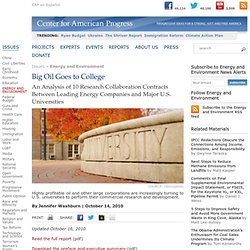
By Jennifer Washburn | October 14, 2010 Updated October 16, 2010. Read the full report (pdf) Download the preface and executive summary (pdf) Methodology Download to mobile devices and e-readers from Scribd The world’s largest oil companies are showing surprising interest in financing alternative energy research at U.S. universities. Why are highly profitable oil and other large corporations increasingly turning to U.S. universities to perform their commercial research and development instead of conducting this work in-house?
The answers to these three questions are critical to energy-related research and development in our country, given the current global-warming crisis and the role that academic experts have traditionally played in providing the public with impartial research, analysis, and advice. 1. 2. BpOffCampus. @bpOffCampus. BP Off UC Berkeley Campus! 20 April 2013. On Napolitano's First Day 30 Sept 2013. DN! Oil Giant BP to Give $500 Million to UC Berkeley for Biofuels Research. AMY GOODMAN: There is a controversy raging at the University of California, Berkeley, where British Petroleum, where BP — they’ve called themselves now Beyond Petroleum — has promised to give $500 million to the university over the next 10 years.

The deal would fund the development of "sustainable, commercially viable, and environmentally friendly" sources of energy. The newly created Energy Biosciences Institute, or EBI, claims to promote research into biofuels, as well as bacteria that would increase energy production from oil and coal. Miguel Altieri. Miguel Altieri is a Professor of Agroecology at the University of California, Berkeley in the Department of Environmental Science, Policy and Management.
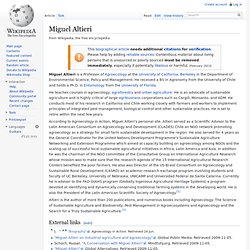
He received a BS in Agronomy from the University of Chile and holds a Ph.D. in Entomology from the University of Florida. He teaches courses in agroecology, agroforestry and urban agriculture. He is an advocate of sustainable agriculture and is highly critical of large agribusiness corporations such as Cargill, Monsanto, and ADM. He conducts most of his research in California and Chile working closely with farmers and workers to implement principles of integrated pest management, biological control and other sustainable practices.
He is set to retire within the next few years. (pdf)bigoilu. Demonstrators protest joint UC Berkeley, BP project. BERKELEY, CA (KGO) -- Protesters who are angry with BP about the gulf oil spill demonstrated at UC Berkeley Friday night against a joint project between the university and BP to build a new $500 million research site.
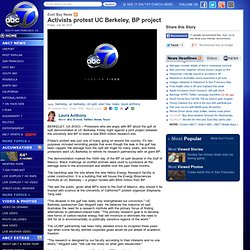
Friday's protest was just one of many going on around the country. It's two purposes included reminding people that even though the leak in the gulf has been capped, the damage from the spill will linger for many years, and these protesters want UC Berkeley to rethink its research partnership with oil giant BP. The demonstration marked the 100th day of the BP oil spill disaster in the Gulf of Mexico. Black markings on stuffed animals were used to symbolize all the damage done to the environment and wildlife over the past three months. BERKELEY: Critics Of BP Protest UC Berkeley's Acceptance Of... 2.1.2007 - BP selects UC Berkeley to lead $500 million energy research consortium.
UC Berkeley Press Release BP selects UC Berkeley to lead $500 million energy research consortium with partners Lawrence Berkeley National Lab, University of Illinois By Robert Sanders, Media Relations | 1 February 2007 BERKELEY – Global energy firm BP announced today (Thursday, Feb. 1) that it has selected the University of California, Berkeley, in partnership with Lawrence Berkeley National Laboratory (LBNL) and the University of Illinois at Urbana-Champaign, to lead an unprecedented $500 million research effort to develop new sources of energy and reduce the impact of energy consumption on the environment.
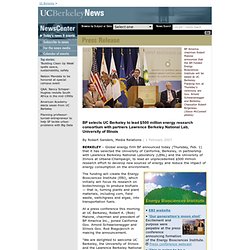
The funding will create the Energy Biosciences Institute (EBI), which initially will focus its research on biotechnology to produce biofuels — that is, turning plants and plant materials, including corn, field waste, switchgrass and algae, into transportation fuels. At a press conference this morning at UC Berkeley, Robert A. "With tremendous support from Gov. University of California’s Biotech Benefactors MIGUEL A. ALTIERI & ERIC HOLT-GIMENEZ / Commentary / Berkeley Daily Planet 6feb2007. University of California’s Biotech Benefactors MIGUEL A.
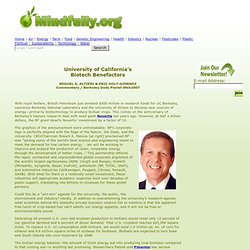
UC Berkeley's BP Deal Tainted By Oil Spill: $500 Million Research Agreement At Stake. BERKELEY, Calif. — BP's catastrophic oil spill in the Gulf of Mexico is fueling opposition to the University of California, Berkeley's research partnership with the British company, with activists and professors on the famously liberal campus calling for a severing of ties.
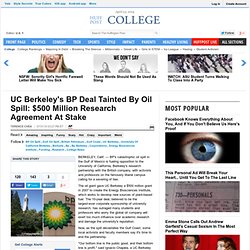
The oil giant gave UC Berkeley a $500 million grant in 2007 to create the Energy Biosciences Institute, which works to develop new sources of plant-based fuel. The 10-year deal, believed to be the largest-ever corporate sponsorship of university research, has outraged many students and professors who worry the global oil company will exert too much influence over academic research and damage the university's reputation.
Now, as the spill devastates the Gulf Coast, some local activists and faculty members say it's time to end the partnership. "Our bottom line is the public good, and their bottom line is profit," said Ignacio Chapela, a UC Berkeley professor of environmental science. Online: OccupyCalCampus: #OccupyCal #CalOpenU teach-in... Reclaimuc : In 2007 #UCBerkeley activists... BERKELEY / Cal sees BP deal as landmark / Research could lead more quickly to making alternative fuel a reality. UC Berkeley's landmark deal with oil giant BP to develop biofuels marks what is by far the largest alliance ever between industry and academia -- a partnership university officials believe has a potential global impact of bringing new clean energy technologies swiftly to market.
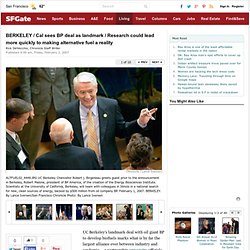
"This is our generation's moon shot," UC Berkeley Chancellor Robert Birgeneau said Thursday in announcing a $500 million grant from British Petroleum to an academic consortium led by Cal. Energy Biosciences Institute. The Energy Biosciences Institute (EBI) is an organization dedicated to developing new sources of energy and reducing the impact of energy consumption.
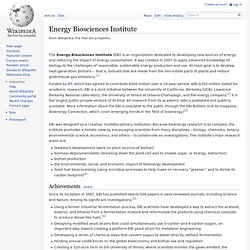
It was created in 2007 to apply advanced knowledge of biology to the challenges of responsible, sustainable energy production and use. Its main goal is to develop next-generation biofuels -- that is, biofuels that are made from the non-edible parts of plants and reduce greenhouse gas emissions.[1] Funded by BP, which has agreed to contribute $500 million over a 10-year-period, with $350 million slated for academic research, EBI is a joint initiative between the University of California, Berkeley (UCB), Lawrence Berkeley National Laboratory, the University of Illinois at Urbana-Champaign, and the energy company.[2] It is the largest public-private venture of its kind.
All research from its academic labs is published and publicly available. EBI was designed as a creative, multidisciplinary institution. Achievements[edit]